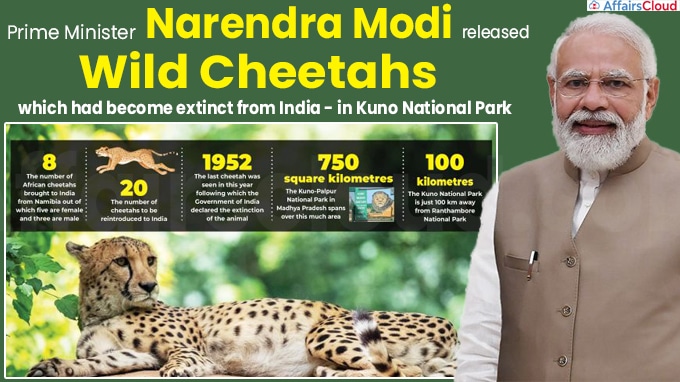 Prime Minister Narendra Modi has reintroduced wild Cheetahs (Acinonyx jubatus) in Kuno National Park, Madhya Pradesh, as part of “Project Cheetah”, the world’s first inter-continental large wild carnivore translocation project.
Prime Minister Narendra Modi has reintroduced wild Cheetahs (Acinonyx jubatus) in Kuno National Park, Madhya Pradesh, as part of “Project Cheetah”, the world’s first inter-continental large wild carnivore translocation project.
- Of the eight Cheetahs that were introduced in India, five are females and three are males.
Since Cheetahs were proclaimed extinct in Indian forests in 1952, these Cheetahs have been brought from Namibia (Africa) and are being introduced into India. The very last cheetah was killed in India in 1947.
Background
i.The idea of reintroducing cheetahs was first proposed in 2009 by conservationists working with the Cheetah Conservation Fund (CCF), an international non-profit organisation based in Namibia dedicated to protecting the cheetah in the wild.
ii.In 2020, the Supreme Court of India gave its approval for the introduction of the African Cheetah and established an Expert Committee to help National Tiger Conservation Authority (NTCA) introduce the animal to India.
iii.In July 2022, India and the Republic of Namibia inked a historic Memorandum of Understanding (MoU) on Wildlife Conservation and Sustainable Biodiversity Utilization.
Role of Cheetahs in The Ecosystem
i.The introduction of wild Cheetahs into India will revitalize and diversify the country’s biodiversity and ecosystem.
ii.Cheetahs will aid in the restoration of open forest and grassland habitats in India.
iii.This will benefit society by conserving biodiversity and improving ecosystem services such as water security, carbon sequestration, and soil moisture conservation.
iv.This endeavour will also result in increased livelihood options for the local community through eco-development and ecotourism activities.
Global Recognition of the Cheetahs
i.The Cheetah, widely regarded as the planet’s fastest land animal, is also the least deadly big cat.
ii.The International Union for Conservation of Nature (IUCN) Red List of Threatened Species classifies the Cheetah as ‘Vulnerable’ species.
iii.It is mostly found in African Savannahs and is reported to have a diminishing existing population of less than 7,000 individuals.
Outcome of Indian Sustainability & Environmental Protection Initiatives
i.Protected Areas presently cover 5.03% of India’s geographical area, up from 4.90% in 2014.
- This includes a rise of Protected Areas in India from 740 with an area of 1,61,081.62 square kilometres (km²) in 2014 to the current 981 with an extent of 1,71,921 km².
ii.In the last four years, Forest & Tree Cover has expanded by 16,000 km².
iii.In addition, the number of Community Reserves have increased to over 100 in 2019 from only 43 in 2014.
iv.India has 52 Tiger Reserves spanning roughly 75,000 km²across 18 States, accounting for nearly 75% of the world’s wild tiger population.
- India accomplished its goal of doubling the number of tigers in 2018, four years ahead of its target year of 2022.
- India’s tiger population grew from 2,226 in 2014 to 2,967 in 2018.
- The Tiger Conservation budget has increased from Rs. 185 crore in 2014 to Rs. 300 crore in 2022.
v.The Asiatic Lion population has steadily increased to 674 individuals, a 28.87% rise (one of the fastest growth rates so far) from 523 lions in 2015.
vi.India currently has 12,852 Leopards, compared to the previous estimate of 7910 made in 2014, and their population has grown by more than 60%.
Recent Related News:
i.In August 2022, Indian Oil Corporation Limited (IOCL) signed an MoU with National Tiger Conservation Authority (NTCA) for transcontinental relocation of ‘Cheetah’ in its historical range in India. Under the project, 8-10 Cheetahs will be flown in from Namibia and South Africa and will be introduced at Kuno National Park, Madhya Pradesh.
ii.It is a national project involving NTCA, Govt. of India and the State Government of Madhya Pradesh (MP). NTCA is the nodal agency authorized by the Ministry of Environment, Forest and Climate Change (MoEF&CC) for funding, supervision and hand holding.
About Namibia:
Prime Minister – Dr. Saara Kuugongelwa-Amadhila
Capital – Windhoek
Currency – Namibian Dollar (NAD)




